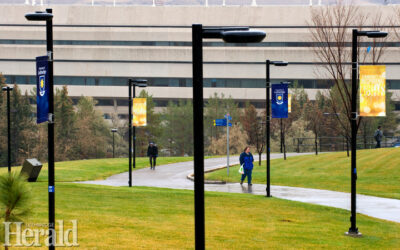Chamber CEO says post-secondary cuts impact Lethbridge economy
By Herald on May 27, 2021.
 Cuts to the city’s post-secondary insititutions have effects on both the city and provincial economy, says Lethbridge Chamber CEO Cyndi Vos. Herald file photo
Cuts to the city’s post-secondary insititutions have effects on both the city and provincial economy, says Lethbridge Chamber CEO Cyndi Vos. Herald file photoAl Beeber – Lethbridge Herald
The business of education has a huge impact on the provincial and city economy and the cut culture needs to end, the Southern Alberta Council on Public Affairs (SACPA) was told Thursday in its weekly online YouTube session.
Cyndi Vos, CEO of the Lethbridge Chamber of Commerce, addressed the financial impact the University of Lethbridge and Lethbridge College have on the economy and the need to bring stakeholders together to develop and encourage local leaders of the future.
Vos is a double alumnus of the U of L who spent 20 years with We Care Health Services, serving as CEO for 10. In 2019, she took over the role of CEO at the Chamber.
She is on the U of L Senate, Economic Development Lethbridge’s board of directors, the Reconciliation Lethbridge Advisory Committee and the Community Wellbeing & Safety Strategy Advisory Committee.
As a musician, she has performed as a solo concert pianist in Canada and other countries.
Vos told the session the U of L alone contributes $1.7 billion annually to the Alberta economy with half of that staying in Lethbridge.
According to SACPA, “tens of millions of public education dollars have been cut from Lethbridge’s two post-secondary institutions’ budgets, resulting initially in hundreds of lost jobs and hefty increases in tuition for students. Arguably, there are also many indirect economic and knowledge losses to consider in the longer term.”
The business of education benefits three distinct groups, the audience was told. Those include government, employers and students.
The benefit to government comes in ways including an increased tax base, human capital theory, access to research and development, and social responsibility. For employers, benefits include high quality products, increased profits, increased productivity and the acquisition of knowledge and skills. For students, the benefits are increased income potential, economic equity, networking — which Vos says is difficult during the COVID era, as well as work ethic and creative and critical thinking.
Seventy per cent of U of L students, she said, are from out of the city with 35 per cent coming from Calgary.
“This influx of students has a significant impact on the local economy. But it also has an impact on the other side and I believe we are seeing that more and more this year with the access to labour. We need the labour force of the students in our community to have a successful business environment. “
The experience students get working, she said, is an economic impact on the community.
“When the students aren’t here, our city isn’t as full. And when we don’t have access to research, our potential isn’t as full. So those changes to budgets have a severe impact on our local economy.”
Getting those consumers of the business of education at the same table is essential, she said.
“Leaders of today must work with the leaders of tomorrow. This must include government, students and their institutions. There are strong, strong collaborations and strong, strong partnerships,” she said about “amazing things” being done by both the college and university.
“The way we can support them is to help them continue with these things.”
Shopping local, investing local, building local, and exploring local are important, Vos added.
“Growth occurs with strong local stakeholder development and partnerships,” a slide she showed stated. “Working with local leaders of today to develop and encourage local leaders of tomorrow. And we have some powerful wisdom in our community and we need to encourage them to keep looking forward even in times as disruptive as they are right now. . .
“The government has announced these cuts. How are we going to fill some of these pots back up so we can ensure our university and our college can continue to do the excellent work they’re doing?”
Vos said a new task force led by the Alberta Chambers of Commerce and the Council of Post-Secondary Presidents of Alberta is going to “focus on strengthening the alignment of post-secondary programming with opportunities for business growth and expanding work-integrated learning opportunities for post-secondary students.”
The force will include regional representatives from business, education institutions, industry and funding leaders.
“That is getting everybody at the same table and having some of those difficult conversations.”
Are severe funding cuts to the college and university likely to have short and long-term consequences to the Lethbridge economy,? she asked.
“My first instinctual answer is yes, of course this does. And what are the opportunities? How can we look back to our bullseye of communication skills, team environment, civic involvement, project management and leadership? Does that change the actual coming into the university now? No. Does that change the really, really tough decisions that leadership from those institutions have to make? No. But together we can show the government there is a better way. We must find a resource that will resolve the cut mentality and look toward a growth mentality. That resource is, I believe, our future leaders” led by the wisdom of current leaders, she added.
Follow @albeebHerald on Twitter
27-26




